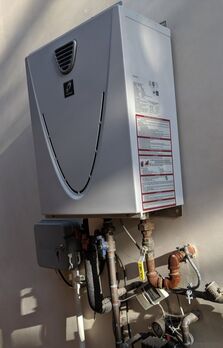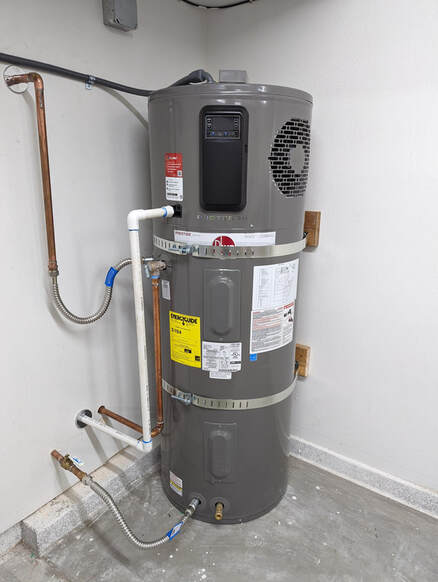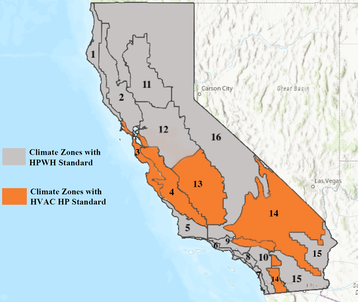 In the homes we grew up in, we all happily ran our homes and businesses on tank water heaters. We found room for them in interior and exterior closets and the corner of the garage. But then came tankless water heaters and their promise of never-ending hot water. You could bolt them to the wall too and take up no floor area. The 2013 California energy code gave us such a big compliance credit for putting a gas tankless water heater in our designs that high-performance walls and -attics were the standard but completely avoidable. Ever notice that tankless water heater manufacturers have Japanese names? Rinnai, Takagi, Noritz… That’s because tankless water heaters were created in Japan to solve a very Japanese problem – no space for a tank of water in dense city apartments. Once Americans saw them, they had to have them too; we suddenly acquired a new-found need for unlimited hot water. They were marketed smartly as energy savers [look, there’s no wasted energy keeping that tank full of water hot!], but at 200,000 btu/hr, they are like taking a machine gun duck hunting – overkill. The past few years in California, gas tankless water heaters have been the standard in new homes and remodels. Enter climate change and the need to reduce Greenhouse Gas (GHG) emissions. Our modeling software proves that HWPHs have 80% lower GHG emissions and 50% lower energy use than gas tankless.[1] This is the single biggest thing you can do to bring down overall home GHG emissions. We now realize that heating our homes and our water with gas is a luxury we can no longer afford. California has appropriately realized that electric heat pump water heaters are the right system for almost every project – efficient, quiet, and more than capable of supplying all the hot water a family might need. There’s just one catch – they are tank water heaters, and require a 3’ square footprint. [1] Modeling based on new code-compliant 2-story 4 bedroom home in Inland Empire Southern California (CZ10) on 2022 CBECC-RES software comparing typical efficiency gas tankless (uef 0.81) and typical efficiency HPWH (3.5 COP) in garage. So how do we transition the California market from gas tankless water heaters to heat pump water heaters, now that we are addicted to the idea that we need never-ending hot water? It starts with realizing HPWHs are a whole lot more efficient than the old tank water heaters we grew up with (the tanks are so well insulated they lose ~4 degrees over the course of a day) and we can always find a closet or corner of the garage to put them in. Next, we need to provide training to the trades, builders, and architects on how to install them without problems. In single family homes, they can go in the corner of the attached garage or in a closet with a louvered door. In multifamily buildings, each unit can get one in a closet or they can be piped together to serve as a central system. New tools like Ecosizer are helping design such systems.
The time is now, because the climate crisis cannot be ignored and we can’t continue installing gas systems today when we know better and what we build today will operate that way for 10+ years. PLUS, there is incentive money in the TECH Program to encourage the gas-to-heat-pump water heating transition -- $3,100 for every Californian in PG&E, SCE, and SDG&E territories to replace their gas water heater with a HPWH. The 2022 California energy code took a few steps in the right direction to encourage this transition:
So take the money and run your house’s water heater on electricity. And take advantage of all the training offered by your utility, the water heater manufacturers, and Energy Code Ace, because heat pump water heaters are coming in hot!
0 Comments
Your comment will be posted after it is approved.
Leave a Reply. |
AuthorNick Brown, CEA Archives
August 2022
Categories
All
|
Proudly powered by Weebly



 RSS Feed
RSS Feed